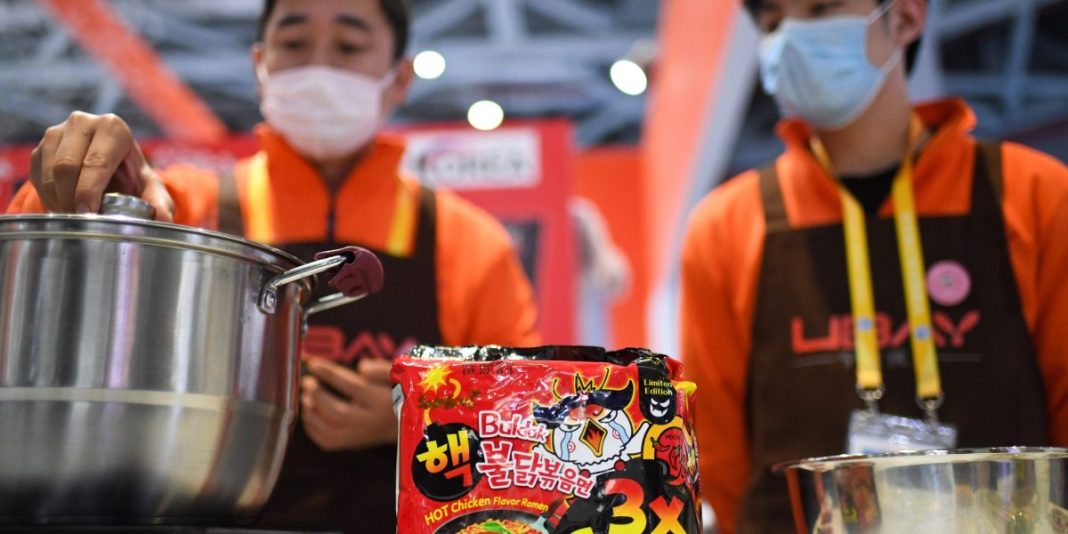A Danish food regulator recalled a brand of instant noodles, declaring the chewy, umami-filled strings posed a health hazard, despite not having quality control issues. They were too spicy.
The Danish Veterinary and Food Administration (DVFA) made the decision to recall three varieties of the popular Buldak instant noodle brand because they were deemed too heavy on the chili.
The noodles “are being recalled as the levels of total capsaicin in the products pose a risk of acute poisoning,” the Danish agency said in a statement on Tuesday.
Capsaicin is the naturally occurring ingredient that makes chili peppers spicy, and the culprit behind the burning sensation diners either love or hate in a meal.
Buldak noodles are made by Samyang Foods, a South Korean company that in 2023 had $2.3 billion in revenue. The word Buldak means “fire chicken” in Korean, an obvious indication of what awaits within the colorful packaging. The three varieties of noodles that were subject to the recall are Buldak Samyang 3x Spicy & Hot Chicken, Buldak Samyang 2x Spicy & Hot Chicken, and Buldak Samyang Hot Chicken Stew.
The noodle recall was unprecedented for Samyang, according to the company. “This is the first time they’ve been subject to a recall for this reason,” a Samyang spokesperson told CNN. It’s “because it is so spicy that it could cause problems.”
The high levels of spice in Buldak’s noodles were a risk especially for “children and weak or elderly people if they consume the total capsaicin content in the packages,” a DVFA spokesperson told Fortune.
Are spicy foods dangerous for your health?
For the most part spicy foods containing capsaicin are not dangerous.
However, extremely high levels of capsaicin can cause nausea, vomiting, and diarrhea and a burning sensation when ingested, according to the National Capital Poison Center, a non-profit hotline for poisonings.
Some studies have found that regular consumption of spicy foods has health benefits. A 2015 study from China found that people who ate spicy food six to seven times a week showed a 14% “relative risk reduction in total mortality” compared to people who ate spicy food just once a week. There is also some research that spicy foods can help with weight loss because they reduce appetite and cause the body to expend more energy, thus burning calories. A meta-study analyzing some 90 clinical trials found that eating spicy foods often “would produce clinically significant levels of weight loss in 1-2 years,” according to a 2012 academic paper.
A noodle brand founded by a former-housewife turned CEO
Buldak noodles were the brainchild of Kim Jung-soo, now Samyang Foods’ CEO. Kim had an unlikely rise to the corner office, marrying into the family that owned Samyang Foods, according to an interview in the Wall Street Journal. She was a housewife until the company hit hard times and her father-in-law, Samyang’s then-chairman, urged her to join the business, which she eventually did as its head of sales despite having no corporate experience.
“There was only desperation,” Kim said of her early days at Samyang.
Eventually she would help turn around the company’s fate when a lunch with her daughter at a rice shop that served extra-spicy stir fry sparked the idea for Buldak. Immediately following the lunch Kim went to a grocery store and bought three of every hot sauce and chili powder. Two sets went to Samyang’s product development and marketing teams respectively. And the last one went back home with her for her own hands-on testing, according to the Journal. After months of research that required 1,200 chickens, two tons of hot sauce, and chili peppers from around the world, the Buldak recipe was perfected.
In the U.S., Buldak’s spiciest noodles gained popularity in recent years after they sparked a social media trend. Buldak’s hot ramen spawned YouTube videos with hyperbolic titles like “Spicy Nuclear Fire Noodle Challenge” and “EXTREME SPICY RAMEN CHALLENGE!!! (DO NOT TRY THIS AT HOME).”
Buldak hadn’t paid influencers to try the product but still welcomed the attention. “Creators expressed themselves in an organic and truthful way,” Kim told the Journal.
The brand then gained even more popularity when it released a carbonara flavor—a reference to the popular Roman pasta dish that features egg, pork cheek, and pecorino and parmesan cheese. That Italian-inspired variety launched its own wave of social media reaction videos—including from A-listers like Cardi B—and sold out across the country. (Cardi B’s social media video caused Samyang’s stock to shoot up more than 30%.)
The DVFA cited the rise of these social media challenges in the country as one of the reasons for its own decision to ban Buldak’s spiciest products. This isn’t the first time this year a spicy food was subject to a recall because of a social media challenge. In the U.S. a teen died after a social media challenge that encouraged people to eat a single, extra spicy tortilla chip. The manufacturer Paqui, then asked retailers to stop selling the product.
Spice-averse Danes who still want to try the product might take a page from Kim who herself found Buldak noodles too hot. “But after eating them for a long time, it’s become more and more delicious and familiar,” she told the Wall Street Journal.


